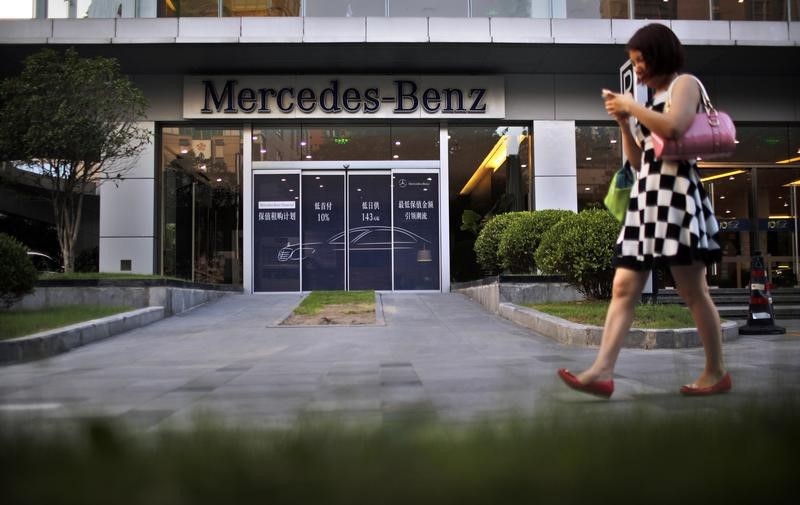By Joseph White and Nick Carey
NEW YORK (Reuters) - China's demand for luxury cars used to move in one direction - up. Now, the prospect of a sustained slump in Chinese demand, prompted by sharp declines in Chinese equity markets and a devaluation of the yuan, has global auto manufacturers scrambling to find new markets to sell goods.
German car makers are reviewing how many vehicles to send to China or the U.S., and U.S. dealers say they expect to get more Mercedes, Audi and BMW sport utility vehicles to sell as a result. A longer term slump could prompt automakers to export more vehicles from Chinese factories or absorb the short-term cost of production cuts, analysts said.
Most global automakers have significant manufacturing operations in China they want to keep running. Industry executives say China is still a growth market over the long haul, even if the pace of growth slows.
To offset the sharp slowdown in the growth of overall sales, vehicle manufacturers in China are pushing sales of sport utility vehicles that typically generate more profit per vehicle.
"The real winners in the first half are the Chinese manufacturers, in that very small cheap SUV-type segment. We need to understand that and adapt," said Linda Jackson, head of Peugeot SA's (PA:PEUP) Citroen brand.
Before the market declines and the currency devaluation, demand for SUVs was strong in both China and the U.S., creating a tug of war over vehicles between U.S. and Chinese dealers for Daimler AG's (DE:DAIGn) Mercedes-Benz brand, BMW AG (DE:BMWG) and Volkswagen (XETRA:VOWG) AG's (DE:VOWG_p) Audi brand. As Chinese demand weakens, that should mean more German-brand SUVs will be shipped to the U.S.
"Competitive pressure in the U.S. has intensified," BMW's Chief Financial Officer Friedrich Eichiner said earlier this month. "Because of the stronger dollar, many manufacturers are allocating units from China or other emerging markets, to the United States."
BMW expects to sell more redesigned X3 compact sport utility vehicles in both China and the U.S. during the remainder of this year, as production ramps up at its factory in Spartanburg, S.C., BMW's global sales and marketing chief, Ian Robertson, told Reuters in an interview Wednesday. Robertson said BMW sales in China are still growing, but at a 2 percent rate, about half the rate anticipated earlier this year.
"We're still tracking at very high monthly numbers compared to every other market," he said.
Daimler said "reallocations due to market fluctuations are, to a certain degree, a normal process," and added in a statement Friday that the company "will closely monitor the developments of the Chinese market and the stock exchange in order to react quickly if necessary."
A prolonged slowdown in vehicle demand could lead more manufacturers to export vehicles from China, said James Chao, Shanghai-based Asia-Pacific managing director at industry consultant IHS Automotive. General Motors Co (NYSE:GM) is considering exporting Buicks from China. Other Chinese producers, such as steel makers, are already moving to step up exports to take advantage of the cheaper yuan.
Brilliance China Automotive Holdings Ltd, BMW's joint venture partner in China, said in a recent filing that exports of vehicles is currently under review, UBS analyst Philippe Houchois noted in a report last week.
